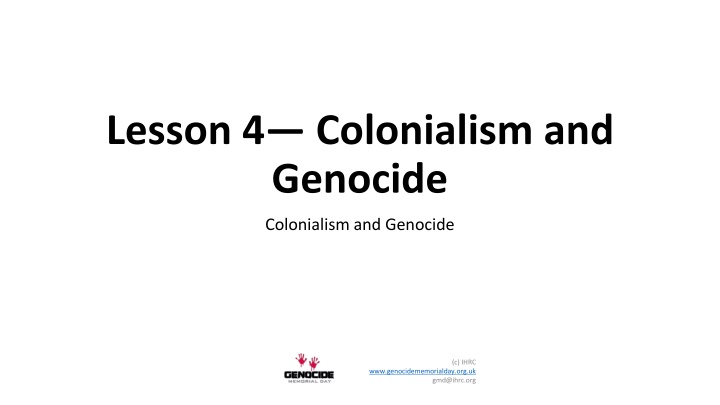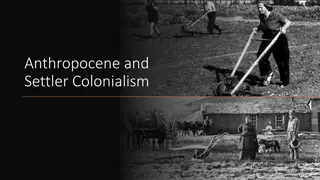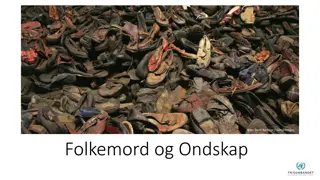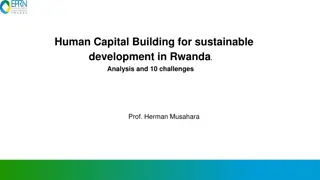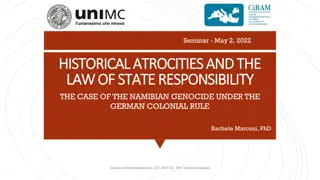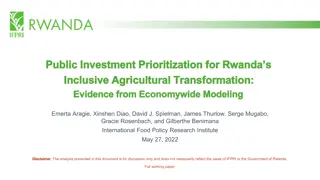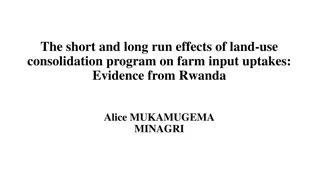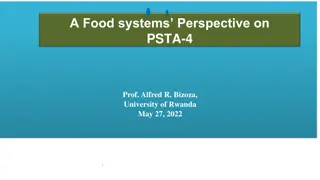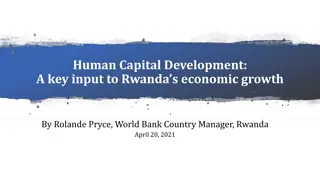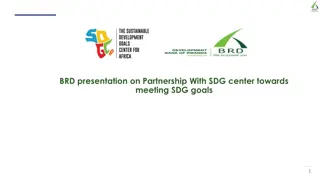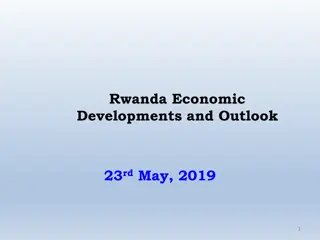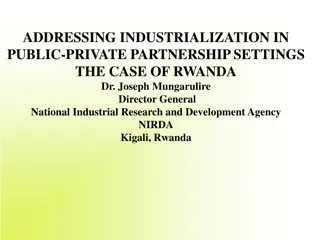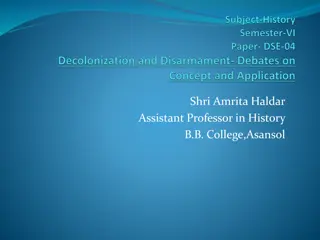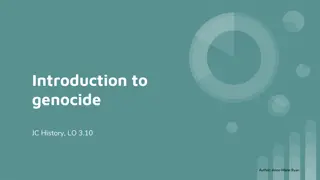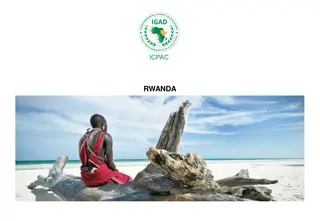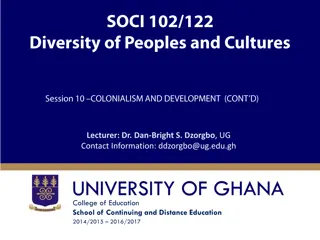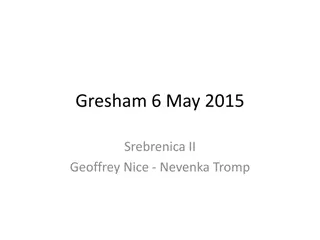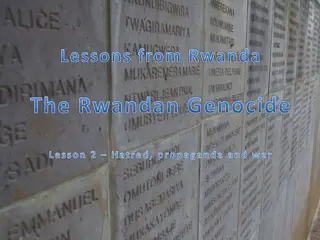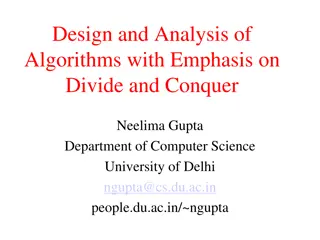Colonialism and Genocide: Impact of Divide and Rule in Rwanda
Colonialism in Rwanda exploited existing divisions between the Hutu and Tutsi, leading to heightened tensions and manipulation by the colonial government. This ultimately contributed to the genocide in Rwanda, which was not a sudden event but the culmination of years of historical tensions and exploitation. The Belgians favored the Tutsi over the Hutu, perpetuating unequal power dynamics and creating conditions that fueled violence.
Download Presentation

Please find below an Image/Link to download the presentation.
The content on the website is provided AS IS for your information and personal use only. It may not be sold, licensed, or shared on other websites without obtaining consent from the author.If you encounter any issues during the download, it is possible that the publisher has removed the file from their server.
You are allowed to download the files provided on this website for personal or commercial use, subject to the condition that they are used lawfully. All files are the property of their respective owners.
The content on the website is provided AS IS for your information and personal use only. It may not be sold, licensed, or shared on other websites without obtaining consent from the author.
E N D
Presentation Transcript
Lesson 4 Colonialism and Genocide Colonialism and Genocide (c) IHRC www.genocidememorialday.org.uk gmd@ihrc.org
Your Initial Thoughts What is divide and rule? (c) IHRC www.genocidememorialday.org.uk gmd@ihrc.org
Colonial Divide and Rule Colonial Divide and Rule Rwanda South Asian Sub-continent Myanmar (c) IHRC www.genocidememorialday.org.uk gmd@ihrc.org
Colonial Divide and Rule Colonial Divide and Rule Divisions existed prior to colonial rule in many places In the case of Rwanda, the Hutu and Tutsi did not always get along The Hutus were often considered Indigenous to Rwanda, and the Tutsi seen as those who migrated into the region The Tutsi often held power over the majority Hutu population The colonial government, however, exploited those differences. (c) IHRC www.genocidememorialday.org.uk gmd@ihrc.org
Genocide in Rwanda Genocide in Rwanda What do you know about the genocide in Rwanda? (c) IHRC www.genocidememorialday.org.uk gmd@ihrc.org
Genocide in Rwanda Genocide in Rwanda The genocide in Rwanda was not a single act of violence, but rather years of tension coming to a head Violence outside the West is often understood as an act of barbaric violence that does not have a history. (c) IHRC www.genocidememorialday.org.uk gmd@ihrc.org
Colonial Rule in Rwanda Colonial Rule in Rwanda The Belgians mainly worked with the Tutsi and even replaced Hutu chiefs with Tutsi chiefs (By 1959 when the Belgians left, 43/45 chiefs were Tutsi and 549/559 sub-chiefs were Tutsi) Under colonial rule, Hutus experienced heightened levels of forced unpaid labour Tutsi chiefs could now take control of Hutu landholdings in some areas Tutsi were given priority in colonial education In 1945 Belgians forced Tutsi, Hutu, and Twa to carry identity cards to differentiate their ethnicities (c) IHRC www.genocidememorialday.org.uk gmd@ihrc.org
1959 1959- -1962 Revolution 1962 Revolution Overthrow of the Tutsi monarchy; Hutu elites take power. They are backed by the Catholic Church and Belgian Trusteeship authorities Many Tutsi went into exile Tutsi were given little political voice after this revolution 1962 Belgium grants Rwanda Independence (c) IHRC www.genocidememorialday.org.uk gmd@ihrc.org
1994 Genocide 1994 Genocide The Tutsi in Burandi killed many Hutu in the 1970s in an act of genocide Assassination of newly elected Hutu President in Burundi in 1993 caused many Hutu to flee to Rwanda 1994, Hutu president of Rwanda s plane was shot down Tutsi civilians were massacred, and Hutu moderates were also killed Political elites encouraged the Hutu population to kill Tutsi civilians (c) IHRC www.genocidememorialday.org.uk gmd@ihrc.org
Acts of Genocide Acts of Genocide Women, children, and the elderly were massacred, even those that hid in religious buildings Homes were looted and many were victims of sexual violence Acts of torture Regular civilians committed acts of violence against those in their own communities Up to 1 million Tutsi and Hutu s who were seen as pro-Tutsi were killed (c) IHRC www.genocidememorialday.org.uk gmd@ihrc.org
Challenging the Notion of Victims and Challenging the Notion of Victims and Perpetrators Perpetrators Does the case of Rwanda present a history that illustrates that perpetrators of violence can also be victims of violence? (c) IHRC www.genocidememorialday.org.uk gmd@ihrc.org
Bibliography Bibliography Ed. Charny. Israel W. Encyclopedia of Genocide Vol. 1 A-H. ABC-CLIO Inc., 1999. Jesse, Erin. Negotiating Genocide in Rwanda: The Politics of History. Palgrave-Macmillan, 2017. Mamdani, Mahmood. When Victims Become Killers: Colonialism, Nativism, and the Genocide in Rwanda. Princeton University Press, 2001. Prunier, Gerard. The Rwanda Crisis: History of a Genocide. Columbia University Press, 1997. (c) IHRC www.genocidememorialday.org.uk gmd@ihrc.org
